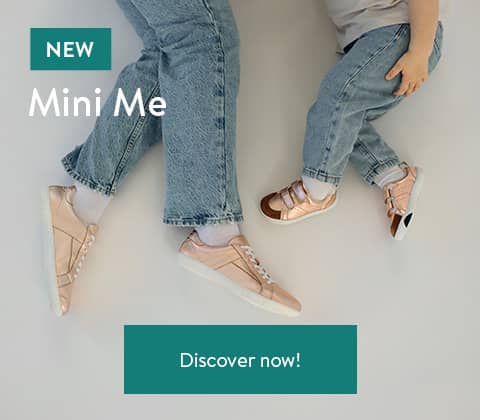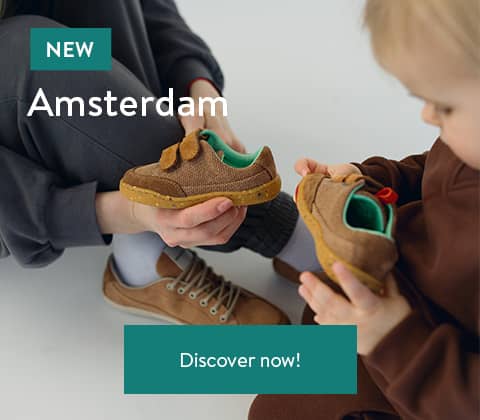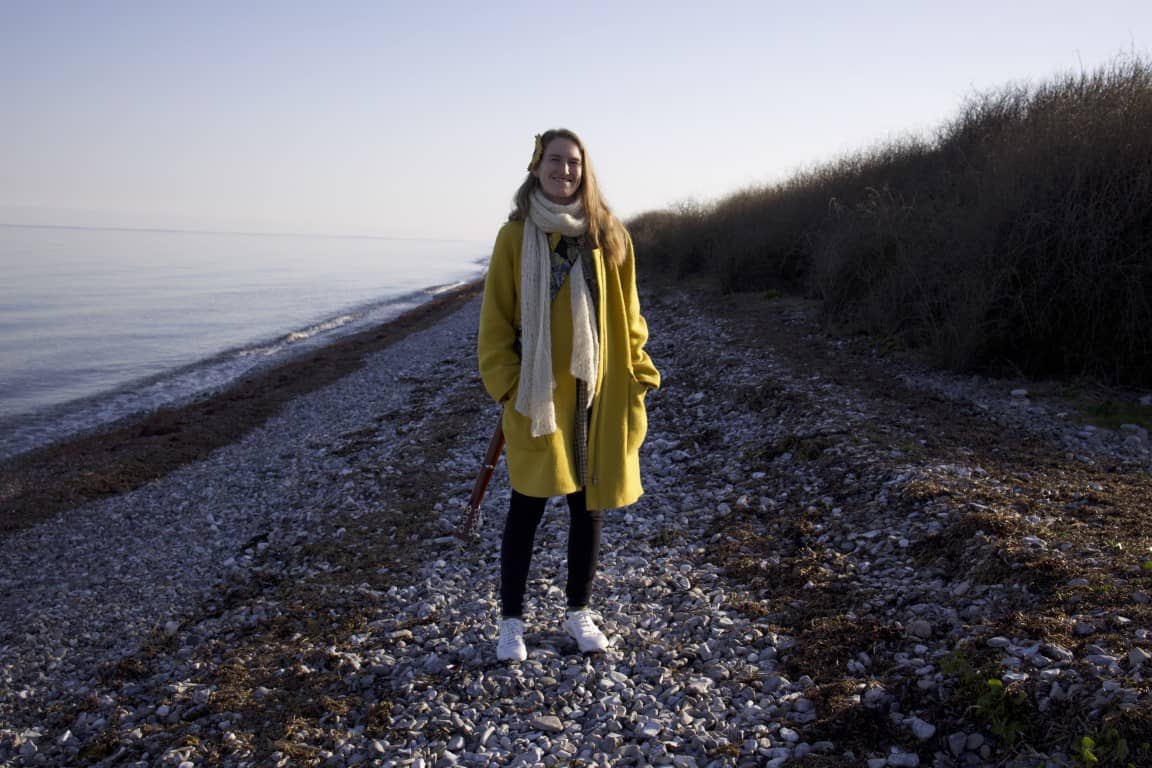Feet on the ground
A homage to lived passions. And a love of walking barefoot
Reaching Julie Sunflower aka Julie Malmström is sometimes a bit of a challenge. The musician from Copenhagen recently moved to the countryside and has fulfilled a little dream of hers - to live close to nature.
When she’s not there among sheep, a pot-bellied pig and two little baby goats, the 34-year-old is on the road. With music as a lived passion in her luggage, she often heads off with her guitar and a rucksack.
From gig to gig, between small and large stages, an artistic project here and there, a video shoot in the woods in between. Julie Sunflower is a prime example of a multi-talented person who, despite all her creativity and inventiveness, prefers to be humble.
Sustainability, a conscious lifestyle, respect for animals and nature, profundity and walking barefoot as much as possible are values they carry her through a turbulent and imaginative everyday life. We met the 34-year-old on the Danish island Omø for a chat and a small live concert by the sea.
1) Julie, what does living your passions mean to you?
Being able to work with my passions on a weekly basis helps me feel alive. I feel lost if I can’t create. Whenever I go through a period where I have no time to write a song, I feel like I have lost myself. Like I have lost who I am as a person. So I try and find a piece of myself through the songs.
I can almost feel my fingers moving and melodies fly out of me. I start humming and I go around the house with my guitar looking for chords or I sit on the sofa and write lyrics on paper and pen - I work with what's closest to me.
The creative urge to create something comes from deep within me. Writing. Singing. Sharing. While working on a song I feel like myself again. I feel purpose. I feel self-love. I want to sing the song for others. I want to play a concert to connect with the audience through the music. I've felt this way since I was a child.
From the age of 12, I started writing full songs on the piano with chords and lyrics in poor 6th-grade English. I wrote songs throughout practically my entire upbringing, even while I studied film and media and worked as a videographer. I also played at open mic nights a few times a year.
2) Being a freelance musician is also quite courageous. Each brave decision offers freedom, self-development and growth but there are also downsides. Can you tell us about this and how you deal with it?
It was both frightening and enlivening becoming a successful singer-songwriter. Financially, it is difficult to earn enough money from concerts as an independent musician. But I keep trying. ME! I don’t want to receive financial help from the State. I don’t like the idea of using money from society. I want to be independent. Instead, I have learnt to lead a frugal but rich life.
I have learnt to save money. I have learnt to manage without things I don't need and to be grateful. I have found somewhere cheap to live. I look through waste containers. I don’t go to the cinema or buy alcohol or takeaway food or drinks. I make all my meals myself. I buy pre-loved. I do not upgrade to the newest version of digital tools. I am careful with my things, so they don’t break. I spend time learning how I can repair my things.
I use dental floss daily and save on dental bills. I have learnt to cut my own hair. I rent out my house which covers my travel costs. And so on. Learning and doing instead of buying is my motto. I wish I had saved more money, but I am thankful that I am debt-free. However, buying a house is not possible. But I have found a nice spot in the countryside to live with my partner and it’s only one hour from our families and from Copenhagen.
We help look after the animals on the farm and have low rent. I love animals so much. It makes me so happy to pet goats, lambs and dogs. It really is a great place to live. My music gigs and video jobs pay enough to make ends meet and buy music equipment. I have a 6-hour-a-week job that pays my rent. I am sometimes lucky and earn some other money here and there, which also helps.
3) To what extent do you try and integrate sustainability into your life?
I integrate sustainability into every part of my lifestyle as much as possible. I always buy pre-loved equipment and clothes whenever possible. I eat as much plant-based food as possible. I repair clothes and look through waste containers. I ride a bicycle and often use public transport. I avoid single-use plastic whenever I can. I sing and speak about sustainable living and the environment. I inspire others. In my Julie Sunflower songs I sing about my love for nature. The song “Questions” from my first album “The Red Balloon” goes:
„I want to be free of debt and all the plastic garbage
If I could choose I would live in a tree house
And maybe I’ll disappear and go powerless
Why do I sit here in the woods and listen closely
Should I rather be back home and help the poor?
Do I do enough to lessen CO2?
I am doing what I can that is for sure“
In the song, I feel like maybe I should just withdraw from society and live in the woods without electricity. I am referring to electrical energy and personal energy. If I were to withdraw from society and live without travelling or leaving any traces behind, I would not have the power to change the world. It's a balance. I know that travelling to different music events produces CO2 but hopefully my concert is an inspiration.
But these days nothing can compensate the environment fully. I pay Climaid, a monthly subscription, which offsets my monthly emissions. It is always best to reduce your emissions but it still makes a difference if big companies plant trees and buy poor people gas ovens, so they do not need to burn wood at home.
4) You also like walking barefoot... why?
When I feel the ground under me through a barefoot shoe, I can move and walk better. More freely. Barefoot shoes also help me because they are wider and have more room for my toes. My feet have gradually expanded over the past few years since I've been wearing barefoot shoes. I have also found out more about my feet and my body as a whole. About what feels right.
I always buy my winter barefoot shoes one size bigger so that air can flow between my wool socks and my feet stay warm. I also have heavy boots and heels because I sometimes need them to be stylish if I want to express myself, but I have managed to find wide boots and comfortable heels. Every time I wear boots with thick soles or heels, my feet and ankles hurt so I don’t wear them very often.
5) When did you wear barefoot shoes for the first time and what was your experience like? What made you want to continue wearing barefoot shoes?
I first found out about barefoot shoes from my friend Marusa. She worked in a barefoot shoe shop in Copenhagen for around eight years. One of the founders of a barefoot shoe brand came to the shop to talk about how he makes barefoot shoes.
He spoke about the effects of high heels and a narrow tow box on the body. Barefoot shoes take us back to nature and to a more natural way of walking, which has really inspired me. My feet are wider than usual and I have always felt constricted in normal shoes. Since then, I have bought new and pre-loved barefoot shoes from various brands. I love walking in them.
6) You recently wore a pair of white Groundies sneakers for the first time. How are things going with them and what feels particularly good about them?
I really like my new white Groundies Nova sneakers. I have been looking for a pair of white barefoot shoes to wear for my concerts for a long time. Until now, I have worn narrower white sneakers from other brands but I am pleased that my new white barefoot sneakers now ground me better and they look and feel grounded at the same time. I now buy other sneakers on Trendsales - the Danish pre-loved clothing app.
I wear shoe size 41 and what I like about the Groundies Nova is that they are the perfect style for me - simple, white and they look good. I normally prefer vegan styles because I find them better but with the Nova sneaker, I knew that I would have lots of opportunities to wear them and they would last a long time. I will wear barefoot shoes for my summer concerts when I wear flowery dresses.
When I plan my concert outfit, I always have a very clear picture in my mind. A dress with lots of flowers and colours, bought pre-loved, and white sneakers. Until now, when wearing white sneakers for concerts I have always had to compromise because the usual narrower styles from other manufacturers pinch my toes together. Every time I have changed from barefoot shoes to a non-barefoot brand, I have felt like my feet are in prison. I have more room for my toes in barefoot shoes. I feel more grounded and can move more easily and freely.
And that is why I like barefoot shoes so much - I love that they give me “five fingers” to walk, move and climb. My outfit needs to be feminine and pretty. The white Groundies are simply perfect for this. Subtle enough not to grab all the attention. But pretty enough so that they go with my clothes.
7) You have written a song about walking barefoot. Feet on the Ground. What is this song about?
I love to get inspiration for writing new songs. A friend of mine, who is also a barefoot fan, asked me whether I had ever thought about writing a song inspired by being barefoot. And I did it. Spontaneously writing a song is not always easy but when the topic is right, the incentive comes from a good friend and I am in the right mood, then the smallest idea or the smallest word can inspire an entire song. So I quickly grabbed my guitar and started to sing and write:
„Feet on the groundGrass between my toes
Move to the sound
Of wherever my mood goes“
The song is about the woods and the coast. I recorded it on my phone and superimposed two vocals. I immediately knew it needed two voices. I soon had a melody and the framework for the entire song. In the subsequent months, I finished the song and recorded a demo version.
I have already played it at four concerts, and I like how naturally the melody flows. I will record it with my friend Anne-Louise, who has the most beautiful alto voice. I love singing with her. We have been friends for a long time, and she has already lent her voice to some of my songs on my first album “The Red Balloon” which I released in 2020.
8) Your daily life sometimes seems very stressful. You are on the road a lot, on your feet a lot. Your feet go through a lot. What is your top tip for looking after your feet?
My feet have been fairly good this year - no problems. If I wear non-barefoot shoes, my ankles sometimes hurt and then I quickly go back to barefoot shoes. My legs sometimes hurt from riding my bike so much. My back and shoulders are often really achy from carrying so much equipment. I ride a bicycle and often use public transport.
It is not only cheaper than a car but much better for the environment. In addition, I get a workout when I cycle to the station and then the peace and quiet of a few hours on the train or bus where I can work on my setlist for my upcoming concert. Sometimes it is difficult trying to get around without a car but it’s not generally a problem for me.
My tips for back pain:
- Do basic training “The Founder” (YouTube)
- Rotate and move your spine regularly throughout the day.
- Massage your spine and shoulders, use two massage balls and roll them forwards and backwards
- Do regular back and shoulder exercises
Time management is not my strong point. Last month I was running late, and I had to run for the bus with a double bass on my back and a rucksack on my front. My legs really hurt the next day. But I see it as training and even when I have to cycle slowly, I listen to an audio book, or I call a friend while I’m cycling. I don’t sweat a lot, so it's not a problem for me to cycle to a concert.
If anything, it probably gives me a natural red colour. Otherwise, I'm quite good at taking the time to relax and slow down after a period of lots of plans and concerts. I try not to stress. If I have used a lot of energy, I relax and then I have a good balance in life. It also helps to do something I enjoy.
9) If you could design your own Groundies, what would they look like?
Oooh, that sounds like fun! Let me think about it. Three ideas come to mind. The first would be an upcycled denim canvas sneaker with a sole made from natural rubber, recycled plastic or recycled leather. It would be great to go out and about wearing a sustainable shoe that also looks upcycled.
My second idea would be a barefoot shoe, which could be transformed from a warm indoor slipper to an outdoor shoe with a cool and simple add-on sole. I don’t know how chic it would look but since I moved to the countryside I change between slippers and rubber boots five to ten times per day. It isn’t a big thing, but it would be clever if it looked good for events and dinner parties and could be worn inside as a slipper during the colder months.
My third idea is a transparent, rainproof barefoot boot. How funny would it be to be able to walk through rain puddles and be able to see your feet or socks? I have a dream of wearing a transparent raincoat, boots and a rucksack.
10) Okay, last question: What are the three most important pillars in life? And do you have a closing thought for our readers, a statement that means something to you and that you would like to share?
My three main pillars, in which I believe 100%, are relationships, music and nature. By relationships, I am referring to my partner, my friends, my family, the animals on my farm, where I live, and everyone I meet who inspires me and makes me curious about life. Music includes the songs I write on my guitar and the beautiful melodies I create on the piano. As well as performing at open mic nights in Copenhagen and listening to others. Jamming with friends on a summer afternoon and dancing to live music at festivals. For me, nature refers to birds singing, walking through the woods and discovering bugs and plants. Taking photos. Swimming in the sea.
A question I like is “How can I be the best version of myself?” This question is always at the back of my mind and allows me to try to make things better and to take the right direction in life.
I also like what Joshua Fields from “The Minimalists” once said during a podcast: “I get to do this”. He was talking about the things in his life that are difficult for him - whether it’s work or other challenges such as cycling uphill with music equipment. Instead of complaining and getting annoyed and asking, “Why do I have to do that?”, he suggested that we instead say: “I can do that! I can travel for six hours and play a two-hour concert. I can write songs. I am experiencing this world now with all its wonders and all its problems”. This reminds me that I should appreciate every day and try and see the good in everything.
I also once read that we are obliged to share our talent. Art needs to be created and shared, because we need it as people. We need drawings in order to visualise things. We need music in order to experience emotions and sing together. We need beautiful cups, chairs and films in our life. We need art - whether we acknowledge it or not. That helps me to share my music. I don’t have to wait for approval or ask myself whether it is good enough. I must simply do what I can to spread the word because I know it can mean something to the people I meet at concerts.
My partner's nieces once sang along to my song while doing the washing-up “Jeg plukker blomster” (“I’m picking flowers”). They also said to me that they listen to it every time they do the washing-up. It makes me so happy to know that my music means something to others and brings joy.
Instagram: @juliesunflowermusic
Song: Feet on the Ground






















